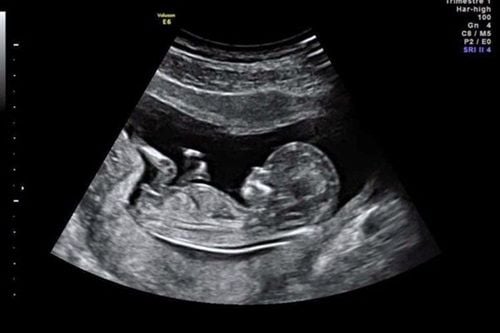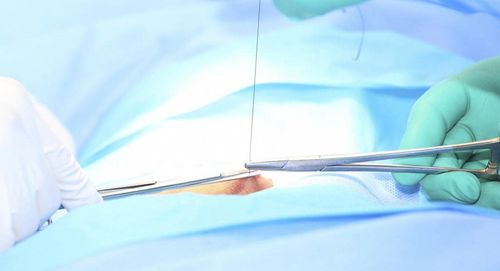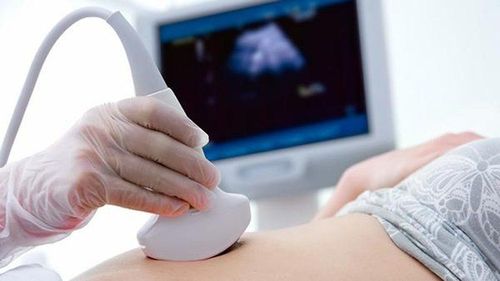The article is professionally consulted by Dr. Nguyen Anh Tu - Obstetric Ultrasound Doctor - Prenatal Diagnosis - Department of Obstetrics - Vinmec Hai Phong International General Hospital.
Ultrasound is one of the essential clinical techniques during pregnancy because it can assess the development of the fetus inside the mother's womb. Therefore, it is necessary to understand information such as whether you can eat before an ultrasound, whether you need to fast for the first ultrasound, etc., to prepare for the best ultrasound procedure.
1. When is the best time for an ultrasound?
Ultrasound is a technique that can record images of the fetus developing in the mother's womb during pregnancy, thereby monitoring the baby's development process and promptly detecting any abnormalities and having appropriate treatment methods. Some important conditions that ultrasound can detect include ectopic pregnancy, placenta previa, fetal abnormalities, etc., which are very dangerous conditions that can threaten the lives of both the mother and the fetus. Currently, some ultrasound techniques are applied, such as using an ultrasound probe placed on the mother's abdomen for examination and using an ultrasound probe inserted into the mother's urethra for examination.

In reality, questions such as when is the best time for an ultrasound and how long into pregnancy should an ultrasound be performed are very common among pregnant women. Some important times for ultrasound that women need to perform during pregnancy are:
- 12-14 weeks: Ultrasound during this period will determine the age of the fetus and measure the nuchal translucency to detect chromosomal abnormalities in the body, suggesting conditions such as Down syndrome, heart defects, diaphragmatic hernia, etc.
- 21-24 weeks: This is the period when ultrasound can detect abnormal shapes, specifically signs of cleft lip, cleft palate, and abnormalities in internal organs.
- 30-32 weeks: In the final weeks of pregnancy, ultrasound can detect conditions such as arterial abnormalities, heart defects, and slow uterine growth, which can lead to fetal distress and asphyxia after birth. Additionally, during this time, the fetus has developed significantly, so ultrasound can determine the position of the fetus in the mother's womb to prepare for the most favorable delivery. Furthermore, ultrasound in the final weeks can also provide information about fetal weight, placenta position, and amniotic fluid levels to best predict the delivery.
Trắc nghiệm: Bạn có biết nên khám thai lần đầu vào lúc nào không?
Việc khám thai lần đầu mang ý nghĩa rất quan trọng, giúp bạn xác định chính xác mình có mang thai hay không? Thai nhi đã vào buồng tử cung hay chưa?... Vì vậy, nếu chưa biết khám thai lần đầu vào lúc nào, trả lời nhanh 5 câu hỏi trắc nghiệm sau sẽ giúp bạn có câu trả lời.2. Can you eat before an ultrasound?
Ultrasound techniques are usually performed when pregnant women visit medical facilities for regular prenatal check-ups as scheduled by their obstetrician. During these check-ups, other tests such as blood tests and urine tests are often prescribed.
For ultrasound techniques, pregnant women can still eat normally. However, to ensure accurate results, it is necessary to limit the use of products containing stimulants such as beer, alcohol, tobacco, carbonated soft drinks, and fruit juices. When having an ultrasound before the 10th week, women need to drink plenty of water and hold their urine so that the bladder is full, which provides clearer ultrasound images. When going for an ultrasound, it is also advisable to wear loose, comfortable clothing to facilitate a smooth and quick ultrasound process.
Recommended video:
Important Ultrasound Milestones
3. Do you need to fast for the first ultrasound?
There are many cases where women, after having sexual intercourse, show signs of pregnancy such as vomiting, nausea, or a positive result on a pregnancy test. They then visit medical facilities to perform tests to check if they are pregnant, including an ultrasound. Since this is the first ultrasound to check for pregnancy, fasting is not necessary in this case. However, before the ultrasound, it is still necessary to drink plenty of water and hold urine so that the bladder is full, which facilitates faster ultrasound waves and better interaction with the fetus, resulting in clearer and more accurate results.
Questions about whether you can eat before an ultrasound and whether you need to fast for the first ultrasound are very common among pregnant women. Therefore, it is essential to equip yourself with the necessary knowledge, including which foods should not be consumed before an ultrasound and the most important times when an ultrasound must be performed to best prepare for childbirth.
Please dial HOTLINE for more information or register for an appointment HERE. Download MyVinmec app to make appointments faster and to manage your bookings easily.
Recommended Video:
Prenatal Health Care: A Guide for Expectant Mothers














